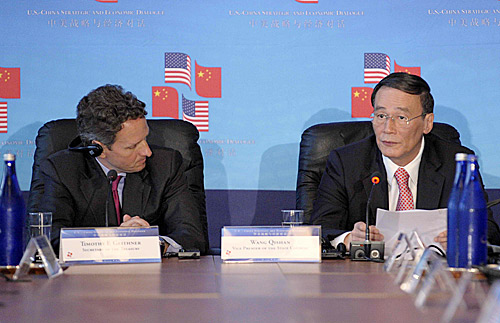|
 |
|
TALKING BUSINESS: Chinese Vice Premier Wang Qishan (right) co-chairs the economic track of the China-U.S. Strategic and Economic Dialogue with U.S. Treasury Secretary Timothy Geithner in Washington, D.C. on July 28 (ZHANG YAN) |
They agreed that the Chinese and U.S. militaries would expand exchanges at all levels. Xu Caihou, Vice Chairman of China's Central Military Commission, will pay a visit to the United States at the invitation of U.S. Secretary of Defense Robert Gates this year.
Officials pledged to encourage cultural exchanges between China and the United States, especially exchanges between the two countries' young people. They also discussed plans to strengthen cooperation on human rights issues, saying they will seek to hold the next human rights dialogue between China and the United States by the end of the year.
Enhancing mutual trust
Surprisingly, the S&ED--the first sizeable gathering of Chinese and U.S. officials since the Obama administration took office earlier this year—did not garner much media attention in Washington, D.C. In fact, few American journalists even showed up at its opening ceremony at Ronald Reagan International Trade Center at all.
Overall, U.S. foreign policy experts were reserved about the meeting's outcome. At a seminar at The Heritage Foundation, a Washington-based conservative think tank on July 21, policy analysts claimed the S&ED would hardly make any headline-making achievements.
The White House had been trying to lower expectations for the dialogue, so that officials could have enough time to establish new contacts and keep their relations on a right track, said Taiya Smith, a visiting scholar in the Carnegie Energy and Climate Program at the Carnegie Endowment for International Peace.
The S&ED offers a dialogue mechanism that focuses on long-term, strategic and overarching issues that defy immediate solution rather than serve as a forum for negotiation, said Yu Wanli, an associate professor at the School of International Studies at Peking University.
It is therefore unreasonable to expect it to generate many agreements on specific issues, he said. The most important achievement of the dialogue, he added, was that it enhanced mutual understanding of Chinese and U.S. government departments, thus helping avoid potential misjudgment of each other's intentions.
Strategic mutual trust has become increasingly essential for China and the United States, according to Yuan Peng, Director of the Institute of American Studies at the China Institutes of Contemporary International Relations.
"What is lacking in China-U.S. relations today is not dialogues, mutually beneficial trade or strategic and security cooperation, but real strategic mutual trust," Yuan wrote in the People's Daily Overseas Edition on July 30. "Due to a lack of mutual trust, the two countries speculate about each other's strategic intentions. This hinders progress in their cooperation on a deeper level."
He said the two countries should give priority to fostering strategic mutual trust in a bid to resolve the bottlenecks in China-U.S. cooperation.
Both sides recognized that the S&ED offered a unique forum to promote understanding, expand common ground, reduce differences, enhance mutual trust, and step up cooperation, said the joint press release. The dialogue, the release added, helped to address shared challenges, such as the global financial crisis, regional security concerns, global sustainable development and climate change.
| 
